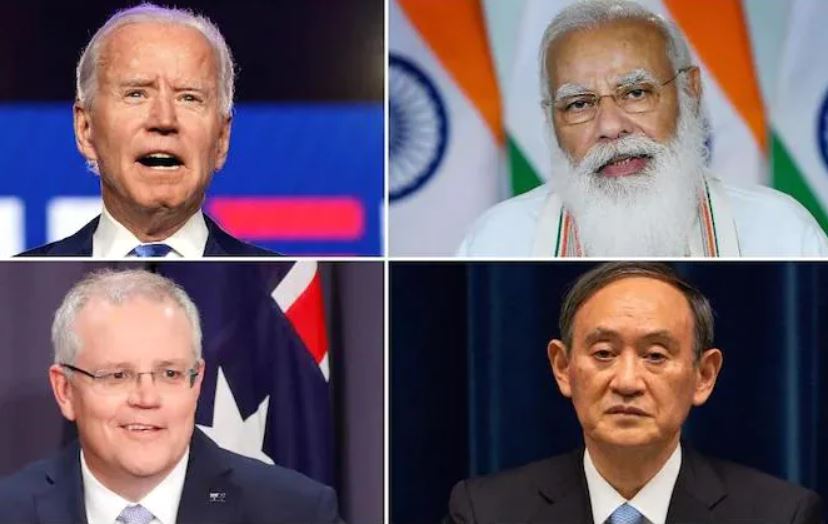Virendra Pandit
New Delhi: After remaining dormant for 13 years since 2007, and its restart in 2017, the conceptual Asian version of the West’s North Atlantic Treaty Organization (NATO) may have reached the drawing board stage on Friday when India’s Prime Minister Narendra Modi observed that the Quadrilateral Security Dialogue (Quad) has “come of age.”
US President Joe Biden, Japanese PM Yoshihide Suga, and Australian PM Scott Morrison deliberated the developments with Modi in the first virtual Summit of the four world leaders, hosted by America.
Morrison set the ball rolling: “As we emerge from this global pandemic (Covid-19) and the global recession, let us together create a different future. It is the Indo-Pacific that will now shape the destiny of our world in the 21st century.”
Modi said: “We are united by our democratic values and our commitment to a free, open, and inclusive Indo-Pacific. Our agenda today — covering areas like vaccines, climate change, and emerging technologies — make the Quad a force for global good. Today’s Summit meeting shows that Quad had come of age. It will now remain an important pillar of stability in the region.”
Quad is viewed as the engine for the ‘Asian NATO’, with four ‘founding’ countries—the US, India, Japan, and Australia—taking the lead.
The way NATO, formed in 1955, was a Euro-American formation against the then Soviet Union, Quad is uniting the Indo-Pacific Region against the resurgent People’s Republic of China (PRC).
The ongoing vaccination against the Covid-19 pandemic became the immediate issue the four countries addressed. The leaders unveiled a Quad Vaccine Initiative in which India will manufacture American vaccines with Japanese funding and Australian logistical support for countries in the Indo-Pacific region.
With this, the four-nation group is setting up a joint front against China, suspected as the source of the pandemic, and making attempts to attract other countries as Quad members.
The Friday Summit also launched three working groups: Quad Vaccine Experts’ Group, Quad Critical, and Emerging Technology Working Group, and Quad Climate Working Group.
“Together, Quad leaders are taking shared action necessary to expand safe and effective Covid-19 vaccine manufacturing in 2021, and will work together to strengthen and assist countries in the Indo-Pacific with vaccination, in close coordination with the existing relevant multilateral mechanisms including WHO and COVAX.”
Clearly, Covid-19 global vaccination and India’s positive role in it are sought to be used as force-multipliers in this diplomatic offensive to attract more countries in the Indo-Pacific Region for their common security concerns. India’s Foreign Secretary Harsh Vardhan Shringla said India’s manufacturing capacity will be leveraged to make a billion doses of US vaccines by 2022.
Another key takeaway from the Summit is the Quad Critical and Emerging Technology Working Group which, in essence, will develop state-of-the-art technology with a shared defense preparedness.
The Summit also pledged to promote a “free, open rules-based order, rooted in international law to advance security and prosperity and counter threats to both in the Indo-Pacific and beyond”, a thinly-veiled reference to China’s aggressive activities in the Indo-Pacific Region and beyond.
According to media reports, the Quad leaders also discussed the Sino-Indian military standoff in Eastern Ladakh since May 2020.
The four leaders agreed that they will meet for an “in-person” summit by the end of the year. They may do so possibly on the sidelines of a multilateral summit like the G-7 in the UK in June, the G-20 in Italy in October, or elsewhere.
US President Biden said: “We are renewing our commitment to ensure that our (Indo-Pacific) Region is governed by international law, committed to upholding universal values, and free from coercion. The Quad is going to be a vital arena for cooperation in the Indo-Pacific. And I look forward to working closely with all of you in the coming years.”
Morrison said: “As four leaders of great, liberal democracies in the Indo-Pacific, let our partnership be the enabler of peace, stability, and prosperity, and to do so inclusively with the many nations of our region to share in their vision, as expressed through the ASEAN, for an open, inclusive — inclusive, and resilient Indo-Pacific; to respect and support their sovereignty, independence, and security by upholding our values and supporting international law; and to address the many challenges we face, from Covid to climate change.”
Suga said: “With the four countries working together, I wish to firmly advance our cooperation to realize a free and open Indo-Pacific and to make a visible and tangible contribution to the peace, stability, and prosperity of the region, including overcoming Covid-19.”
The four nations’ joint statement said: “We bring diverse perspectives and are united in a shared vision for the free and open Indo-Pacific… We strive for a region that is free, open, inclusive, healthy, anchored by democratic values, and unconstrained by coercion. On this historic occasion of March 12, 2021, the first-ever leader-level summit of the Quad, we pledge to strengthen our cooperation on the defining challenges of our time.”
“Together, we commit to promoting a free, open rules-based order, rooted in international law to advance security and prosperity and counter threats to both in the Indo-Pacific and beyond. We support the rule of law, freedom of navigation and over-flight, peaceful resolution of disputes, democratic values, and territorial integrity. We commit to working together and with a range of partners.”

